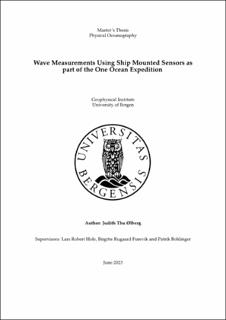| dc.description.abstract | This thesis examines the design and post-processing aspects of wave measurements from ship mounted sensors. The wave measurements exhibit accuracy comparable to wave measuring drifters while offering enhanced spatial coverage and durability. The ship mounted approach is suitable for real-time broadcasting during research expeditions and conventional shipping routes, as well as for the validation of satellite observations and wave models. The system presented here was deployed on the Norwegian tall ship Statsraad Lehmkuhl during a 22-month circumnavigation of the globe as part of the One Ocean Expedition. The wave measurement system utilizes downward facing altimeter probes to capture sea surface elevation, while ship motion is compensated by inertial motion units. The post- processing of the measurements developed by Knoblauch, 2022 has been corrected, updated, and refined. With the software update, the significant wave height measurements exhibit a root mean square deviation of 0.36m and a correlation coefficient of 0.96 compared to satellite altimetry. Compared to a third-generation wave model, the root mean squared deviation is 0.53m, and the correlation coefficient is 0.93. The system overestimates the highest waves, particularly during a major winter storm. Regarding peak period measurements, satisfactory results are obtained when waves oppose the sensor and ship speeds remain below 3m/s or when the ship is stationary. Under these circumstances, the root mean squared deviation ranges from 1.76s to 2.04s, while the correlation coefficients range from 0.77 to 0.80, compared to the wave model. However, as ship speeds increase, the quality of peak period measurements deteriorates precipitously, regardless of Doppler shift corrections. The challenges associated with the Doppler shift are suggested to be improved by complementing directional wave- and current measurements from a navigation X-band ship radar. | |
